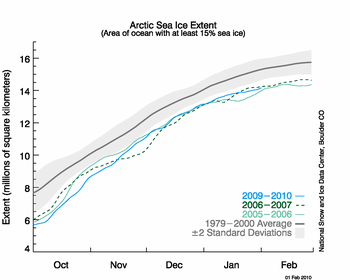The news on climate change over the last few months has been devastating, and I haven't felt capable of writing anything sensible on the topic. The intentionally ignorant deniers have apparently claimed victory in the midst of what was globally the
first or second warmest January on record (first for the southern hemisphere, and I've seen claims of both for the planet as a whole), at the end of
the warmest decade on record. Arctic
ice extent at the beginning of February was at near record lows...

... and well below the 2 standard deviation range from the two previous decades (1979-2000). The report for last month will be issued in the next few days, and from my occasional perusal of the
site's daily charts, winter 09-10 looks to be roughly on par with winter 06-07, the record holder for minimum ice extent thus far.
The point is, the above are facts. They're not predictions. They're not the work of a giggling evil scientist hunched over his spreadsheets in a dimly lit lab, with steamy CO2 vapor coming out of flasks of colored water with dry ice in them.
To the people who are whining, "But it's cold! We have snow! We never get Snow!" I say STFU. I have quite a bit of sympathy with the east coast and Europe, but weather- even a full season of it- is NOT climate. Would it make any difference to your perception if I argued that climate change is happening even faster than we thought because western Oregon had it's warmest January on record, and it's looking like the warmest February too? It shouldn't. Those months at that location are single data points in an enormous set extending over many locations and a period of decades.
One recent bit that really got my attention- not in a good way- was the spin given to the widely publicized "admission" by Phil Jones that there was no warming from 1995 to present. Except it wasn't an "admission," it was a statement of fact: given that 15 year window, he could not, at the 95% confidence level, say that warming was occurring. Once again it's the confusion of "significance" in the statistical sense and effect size. And yes, the effect is there: the trend has been .12 degrees warmer each decade, or almost 0.2 degrees Celsius over the last 15 years. Another way of putting this is that it is as likely that the warming trend is 0.24 degrees as it is 0 degrees per decade. But the most likely trend is 0.12 degrees. Here's the actual quote from
Skeptical Science:
BBC: Do you agree that from 1995 to the present there has been no statistically-significant global warming
Phil Jones: Yes, but only just. I also calculated the trend for the period 1995 to 2009. This trend (0.12C per decade) is positive, but not significant at the 95% significance level. The positive trend is quite close to the significance level. Achieving statistical significance in scientific terms is much more likely for longer periods, and much less likely for shorter periods.
BBC: How confident are you that warming has taken place and that humans are mainly responsible?
Phil Jones: I'm 100% confident that the climate has warmed. As to the second question, I would go along with IPCC Chapter 9 - there's evidence that most of the warming since the 1950s is due to human activity.
 Swans On Tea
Swans On Tea posted the above chart yesterday (the .15 trend is the result of using a specific data set), and I've seen similar arguments elsewhere. George Will has been one of the most vocal and visible deniers in the US. Of course
he ran with this, and of course the illiterate morons at WaPo didn't think to check his facts or representations thereof. That was the op-ed that was so jaw-clenchingly infuriating that I just couldn't take it any more.
For the sake of your children, for the sake of society, and if you're young, for your own sake, if you don't have a clue how science and statistics works, shut your fucking yap. Your opinion
IS NOT of equivalent worth compared to those who have spent lifetimes studying the relevant disciplines. Can you say with absolute certainty that if you load a pistol, stick the barrel in your mouth, and pull the trigger, that your brain will soon afterward exit the back of your skull? No, of course you can't: guns sometimes misfire, shells are sometimes duds. But statistically, following the above procedure would be pretty damned stupid, wouldn't it?
The question is not whether the climate is warming or not: it is. That's a simple fact. The question is how certain do we need to be before we act. Do you want 95%? 99? 99.9? A tenth of a percent is my guesstimation of your chances of surviving as a result of a misfire. (You're actually much more likely to survive by flinching.)
And, oh, by the way, here's what I set out to mention before I got off onto a rant:
the Arctic is being increasingly militarized as a result of warming unlocking mineral resources. And because of denialism, the US risks losing access to resources we should control, or military confrontation if we try to push our claims.
Major melting has spurred Russia, Canada, Denmark (via Greenland), and Norway into a new gold rush, except this time it’s about staking claim to huge reservoirs of natural gas, petroleum, and untold deposits of minerals previously inaccessible because of the polar ice shield. Much of the sub-sea Arctic wealth will of necessity be transported by ships because thawing tundra will be too unstable for pipelines. The South Koreans anticipated this more than a decade ago, building giant vessels to secure a big share of the shipping market.
Sadly, when the claims of the ignorant and unthinking have equal weight compared to those of the informed and educated, this is the result: such a society fumbles and falls behind others. If you want to call that elitist, fine. I'd rather be called elitist than proclaim myself an idiot.











































































































